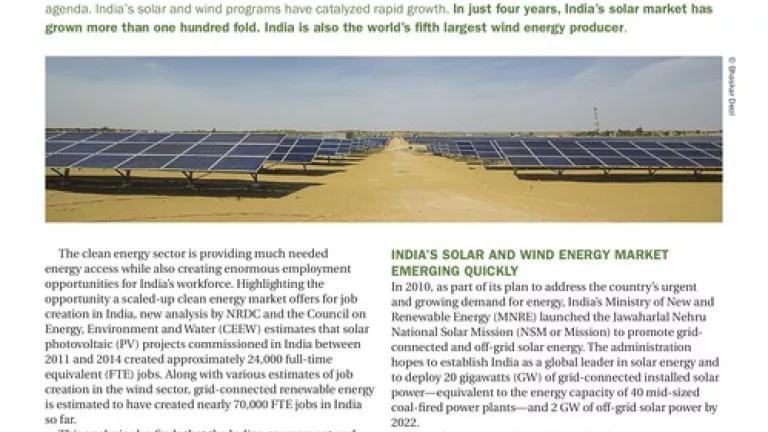
On the heels of the much anticipated first meeting between US president Obama and Indian Prime Minister Modi in Washington DC today, The Energy and Resources Institute (TERI) and Yale University have organized the fifth edition of the US India Energy Partnership Summit tomorrow. The summit will bring together senior political representatives, leading policy makers, researchers and industry from both nations to deliberate and create solutions towards sustainable development with clean energy and environmental sustainability. As part of the Summit, Dr. RK Pachauri, Chairman of the Intergovernmental Panel on Climate Change (IPCC) and NRDC President, Frances Beinecke will be discussing today’s Obama-Modi meeting and NRDC’s new report on “Scaling India’s Clean Energy Market Through Jobs and Financing” The new report finds that India’s rapidly growing solar and wind programs are creating enormous economic opportunity, providing significant employment opportunities for India’s workforce, and expanding much-needed energy access.
The new report, authored by NRDC in partnership with the Council on Energy, Environment and Water (CEEW), is the first independent, external analysis of the employment opportunities for India solar energy and wind energy markets. Together, the wind and solar industries have already created approximately 70,000 clean energy jobs in India, which is likely an underestimate due to a lack of comprehensive job data in the country. According to the analysis, grid-connected solar energy development has created approximately 24,000 full-time equivalent (FTE) jobs during the National Solar Mission’s first phase. Similarly, wind energy development has created more than 45,000 jobs by 2012 based on government estimates.
To further build on these successes, innovative financing solutions are needed to realize the full potential of renewable energy in India. As discussed in the new report, financing clean energy remains a chief barrier in scaling renewable energy in India. While key policy instruments such as feed-in tariffs (FiTs) and viability gap funding (VGF) have contributed to the rapid growth of solar and wind in India, there is much that needs to be done to allay the significant risks perceived by domestic banks. Domestic banks will need to increase loans to renewable energy projects to keep up with financing demand as the market scales up. The Ministry of Finance, Indian Renewable Energy Development Agency (IREDA), National Clean Energy Fund, state governments and domestic banks could increase domestic lending by piloting both green bank and green bond systems for solar energy and other clean energy sources. Such financing mechanisms would help inject new liquidity, reduce the cost of capital, and create revolving funds for future projects.
Even US companies stand to benefit from India’s expanding market opportunities, including companies, such as First Solar, that are currently active in India’s clean energy market. Building on the study’s promising findings, NRDC President Frances Beinecke sent a letter to President Obama, urging him to prioritize climate change and clean energy during this week’s summit with new Prime Minister Narendra Modi. The letter strongly recommends that the US and India should strengthen solar and wind finance to scale clean energy markets through bilateral funding and innovative instruments, such as green banks and green bonds.
Solar and wind energy development have the power to provide greater energy access, create jobs, and mitigate climate change to transform India’s economy. While evident to government, industry, and civil society, this potential power still needs to scale. The successful achievement of renewable energy depends on strong government policies and strategic financing. With stronger leadership, India can support and enable a needed resurgence in the diverse renewable energy projects and products that can sustainably power its future and help mitigate climate change’s worst impacts.
Co-authored by Nehmat Kaur, India Representative
